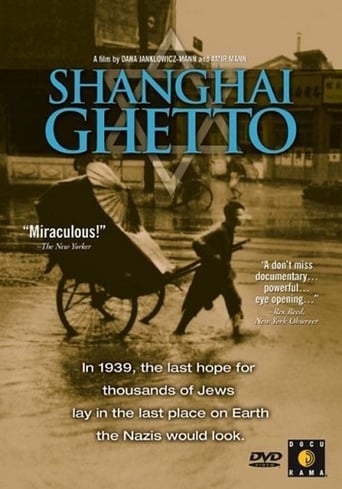Ed-from-HI
"whosoever saves a single life = shall be considered to have saved an entire world" the essence of this immortal statement was exemplified by the 'World' created within the little-known 'Shanghai Ghetto' becoming a strangely-miraculous haven-refuge for approximately 20,000 desperate Jews escaping relentless persecution, merciless concentration-camp detention and near certain death at the hands of the Nazis throughout most of Europe, during pitch-black WWII Epoch."Shanghai Ghetto" is a vitally important and historically-essential documentary by Dana Janklowicz-Mann and Amir Mann, narrated by renowned actor Martin Landau (who passed-away only a few months ago). Presented-documented mainly thru survivor-testimonials by articulate individuals who were children or teenagers during that late-1930s to mid-1940s time-period in Shanghai. One of the most ironic aspects of the 'Shanghai Ghetto' is that at the tragic time when most nations of the World turned a blind-eye to Jewish refugees fleeing Hitler's mass-extermination, the 'Shanghai Ghetto' served as an 'under-the-radar' clandestine sanctuary allowing Jews to be covertly 'accepted' with no Visa, or legal documents necessary for entry. Once safely inside these Jews attempted to re-create a small degree of normalcy.As witnessed in this documentary, the basics of food, medicine, clean-water were scarce for both Jews and the average Chinese citizens living in Shanghai at the time suffering similar shared-hardships together. It is also quite important to note that the Jewish survivors interviewed make it clear they felt little to no degree of anti-Semitism living among the Chinese residents of Shanghai, and that many Jewish children quickly bonded with the Chinese children living in Shanghai.The most intriguing aspect is that this unlikely enclave of Jewish refuge/sanctuary was not specifically 'planned' or directly-sanctioned by any government. It seemed to simply 'come-together' thru a miraculous combination of fortuitous unplanned events. Even though imperial-Japan was militarily 'in-charge' of the area which became the 'Shanghai Ghetto' situated in Hongkou District, Japanese administrators surprisingly did not specifically target Jews (i.e. even though allied with Axis-Germany, Japan did not stringently adhere to Nazi plans).The saddest part of the entire documentary is revealed towards finale, when the Jewish survivors of Shanghai recall soon after the end of WWII, first hearing about the near complete destruction the Holocaust had inflicted on the Jewish populations of Europe i.e. how nearly all their relatives (hailing from Poland, Hungary, Czechoslovakia, Ukraine/ Russia, et al) had been lost/murdered in the Shoah. Ultimately reflecting that the 'Shanghai Ghetto' which seemed quite miserable at first glance, in actuality proved to be a 'paradise' by providing the simple gift of Life.
chimih1
Being a Chinese this documentary moved me in many different ways. The Jewish refugees who were interviewed in this movie viewed the hardship they experienced in the Shanghai Ghetto as positive in general. Even though they were often sick from various diseases because living conditions were poor, and they were often hungry. They appreciated the Chinese spirit, their work ethics, and their ability to survive under the harsh Japanese occupation during the war. Most of all they were grateful to have been able to live in China and were spared the death camps many of their family members were not able to escape. This movie is a testament of the triumph of human spirit over the horrendous adverse conditions and oppression they endured during that turbulent period. All high schools/colleges should show this very well made movie to their students because they can learn so much from watching it. I am so glad I did.
Tmarcovitz
This was an incredible documentary. I was not aware of this part of Jewish History. This was such an interesting story, and so well done. It is emotional at parts and extremley strong. The only thing wrong with this movie is its not long enough. I left wanting to see and know more.
syn201
The stories of the interviewees were rather banal. (I guess we are too much exposed to a similar kind of testimony films nowadays.) But, more problematic is that the life of Shanghai natives at the time was too lightly handled. The Jews who had been better off moved to Shanghai, and now they talk about the hardship they had to go through there. But to me it seemed that their life was lot better than that of the Chinese who were under Japanese occupation and persecution. Those interviewees all left Shanghai after the war, and lived well off (maybe still worse than they used to in Europe, but). I didn't see why their personal stories are that important in that specific context. If there were more about culturally specific difficulties (of being in Shanghai on the other side of the world) rather than just complaints about heat and hygiene, I would be more appreciative about the film.
